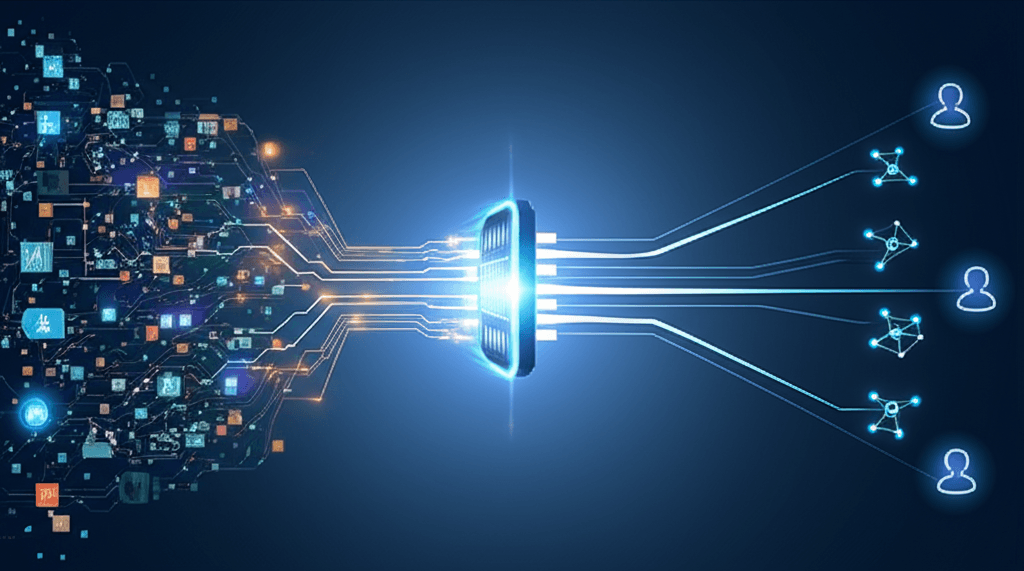IBM Gateway Simplifies Agentic AI and GenAI Tool Integration
IBM's open-source gateway unifies disparate GenAI tools and data, simplifying complex agentic AI development.
June 10, 2025

International Business Machines Corp. has introduced the MCP Gateway, a new component aimed at simplifying the complex landscape of generative AI tool integration and orchestration.[1] This open-source project, released under the Apache 2.0 license, is designed to significantly benefit developers and organizations constructing agentic AI systems, coordinating an array of AI tools, or deploying intricate GenAI applications.[1] The gateway leverages the Model Context Protocol (MCP), a rapidly emerging open standard, to provide a unified and streamlined approach to connecting Large Language Models (LLMs) with diverse external data sources, APIs, and other tools.[1][2][3]
The proliferation of generative AI has brought forth a new set of challenges for developers. Integrating various LLMs, proprietary databases, external APIs, and specialized AI tools into a cohesive and functional application can be a daunting and resource-intensive task.[3] Historically, connecting an AI model to these external entities often involved writing custom code or using specialized plugins for each specific data source or API, leading to integrations that were brittle, difficult to scale, and hard to maintain.[3] This ad-hoc approach creates significant overhead, slows down development cycles, and can introduce security vulnerabilities.[3][4] Furthermore, as organizations increasingly look to deploy "agentic" AI systems – AIs that can autonomously plan, act, and interact with their environment to achieve goals – the need for a standardized and robust method for these agents to access and utilize tools becomes paramount.[5][6] Traditional API gateways, typically optimized for stateless REST-style interactions common in microservices architectures, are often not well-suited for the stateful, long-lived sessions required by protocols like MCP that underpin many agentic systems.[6]
The IBM MCP Gateway, a FastAPI-based component, directly addresses these integration challenges.[1] It acts as a central management point for tool, resource, and prompt registries, adhering to the official MCP 25-03-26 protocol.[1][7] One of its key capabilities is the federation of multiple MCP servers into a single, unified endpoint.[1][7] This means developers can auto-discover peer MCP servers, perform health checks, and merge their capabilities, simplifying the overall architecture.[7] Crucially, the gateway can also "virtualize" non-MCP services, such as existing REST APIs or function endpoints, and expose them as MCP-compliant tools.[1][7] This feature allows organizations to leverage their existing infrastructure and make it readily accessible to AI agents without extensive re-engineering.[7] The gateway supports a variety of transport protocols, including HTTP/JSON-RPC, WebSocket, Server-Sent Events (SSE), and stdio, offering flexibility in how different components connect.[1] It also incorporates essential enterprise features like input validation using JSON-Schema, retry logic, and rate-limiting for REST endpoints, enhancing the robustness and reliability of AI applications.[1][7] For administration and observability, the offering includes a production-ready admin UI built with HTMX and Tailwind, supporting full CRUD (Create, Read, Update, Delete) operations and providing insights into the gateway's functioning.[1] Authentication is handled through schemes such as Basic, JWT, and custom headers, with asynchronous database persistence managed via SQLAlchemy.[1]
The introduction of the MCP Gateway is expected to deliver significant benefits to a wide range of AI practitioners. Individuals and teams constructing agentic systems will find it easier to provide their AI agents with secure and standardized access to the tools and data they need to perform complex tasks.[8][1] By simplifying the orchestration of disparate tools and services, the gateway can accelerate development cycles, allowing for the faster deployment of sophisticated GenAI applications.[9][1] This simplification is particularly relevant as businesses increasingly seek to build AI agents that can interact with multiple data sources and tools in real-time to perform complex operations.[8] Early adopters of MCP, the underlying protocol, have already used it to connect internal systems, enabling AI assistants to access proprietary knowledge bases and developer tools.[8] The IBM MCP Gateway aims to further streamline these processes, making it easier for developers to build AI applications that are more adaptable, context-aware, and ultimately, more powerful.[8][1] The ability to centralize and manage access to AI tools also enhances governance and control, which is a growing concern for enterprises adopting GenAI technologies.[10][11] By funneling LLM API traffic through a gateway, organizations can better manage costs, monitor usage, and enforce security policies.[10][9]
The MCP Gateway is part of IBM's broader strategy to simplify generative AI integration and foster an open ecosystem for AI development.[12][13] The company's focus on integration tools addresses a critical need in the fragmented enterprise AI landscape, where many organizations struggle to achieve expected ROI from their AI initiatives due to integration complexities.[14] IBM is positioning itself as an orchestrator, enabling businesses to connect and manage AI agents and tools from various providers, including their own Granite AI models as well as models from other companies.[14][13] This approach aligns with IBM's historical strengths in providing enterprise solutions and its commitment to hybrid cloud environments, allowing clients to manage data and AI workloads across multiple clouds and on-premises systems.[14][15] The open-source nature of the MCP Gateway further underscores this commitment to interoperability and community-driven innovation.[1] IBM has also recently introduced a draft for a new agent communication protocol (ACP), intended to complement MCP by standardizing how AI agents interact and collaborate, highlighting IBM's ongoing efforts to shape the foundational elements of the evolving AI landscape.[1] The increasing adoption of MCP by major AI players and the open-source community suggests its potential to become a foundational protocol for future AI integrations, promoting interoperability and reducing the overhead associated with custom solutions.[8][3] IBM's MCP Gateway is a significant step in this direction, aiming to make the development and deployment of advanced GenAI applications more accessible and manageable for enterprises worldwide.
Sources
[2]
[5]
[6]
[7]
[9]
[10]
[11]
[12]
[13]
[14]
[15]